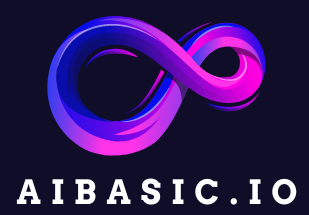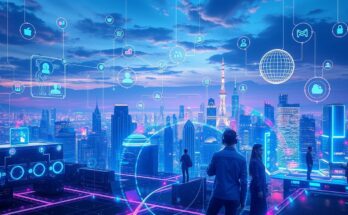AI in Everyday Life: The Future Is Now
Did you know over 70% of consumers use AI in their daily lives? This shows how AI has moved from a future idea to a big part of our lives. You might use smart speakers or get personalized shopping tips, thanks to AI. Here is the details of AI in Everyday Life: The Future Is Now.
AI is now part of our homes and workplaces, not just in labs. It changes how we work and live. From virtual assistants to smart devices, AI affects many parts of our day.

Adopting AI makes our lives better and pushes tech forward. It makes the future of AI an exciting journey for us all.
Key Takeaways
- AI technology is deeply integrated into your daily routines.
- Over 70% of consumers use AI applications regularly.
- Machine learning enhances personalization in services and products.
- Innovations in AI are continually evolving user experiences.
- Understanding AI’s role is key to navigating the future effectively.
The Evolution of AI Technology
The journey of AI technology started in the mid-20th century. It was marked by important milestones. The first AI programs in the 1950s set the stage for what came next.
Machine learning made AI more powerful, letting systems learn from data. This was a big step forward.
In 1997, IBM’s Deep Blue beat world chess champion Garry Kasparov. This victory showed the power of AI and sparked more research and investment.
By 2023, many companies use AI every day. It changes how they work in many fields. Generative AI is a key example, changing content creation, customer service, and more.
AI is now used in healthcare, finance, and entertainment, among others. It brings new innovations to each field. This shows how AI can change experiences and make things more efficient.
The future looks bright for AI technology. By improving machine learning and finding new algorithms, companies can get better at what they do. The ongoing growth of AI is changing how we interact with the world.
AI in Everyday Life: Transforming Daily Routines
In today’s fast-paced world, ai technology has changed how we handle daily tasks. Things like managing schedules or ordering food are now easier and fit what we need. Using AI-powered apps for navigation or scheduling tools that save time, the uses of ai in daily routines are wide and make a big impact.
Smart devices make hard tasks easier, giving us more time for what we love. For example, virtual assistants like Google Assistant and Amazon Alexa help with to-do lists, answer questions, and control smart devices. This shows how technology smoothly fits into our lives.
As we get used to these tools, we focus more on being productive. AI helps us make better decisions that change our day. The growth of ai in daily tasks promises a future where our routines become even easier.
How AI Powers Smart Homes
AI technology makes living better by adding smart features to your home. It changes daily tasks into easy ones. Now, you can control lights, heating, and entertainment with just a click or a voice command.
This technology makes your home fit your life perfectly. It’s all about comfort and convenience.
Integration of AI in Home Automation
Smart home automation has grown thanks to AI. Devices like smart thermostats and lights change settings based on what you like. They learn your habits to save energy and make your home better.
With voice-activated systems like Amazon Alexa or Google Assistant, you can control everything with just your voice. It’s easy and convenient.
Enhancements in Home Security Systems
AI makes home security better with advanced AI security systems. These systems watch and detect threats in real-time. They use smart algorithms and sensors. The best use of ai in everyday lie.
When motion is detected, you get alerts right away. High-definition cameras let you see your home from anywhere. AI gives you peace of mind, keeping your home safe whether you’re there or not.
Machine Learning in Daily Life
Machine learning is changing how we use services and products every day. It makes our daily activities better and helps us stay healthy in big ways.
Personalized Recommendations and Services
Many platforms use machine learning to understand what you like and do. This means you get recommendations that fit your tastes. For example, Netflix and Amazon use this tech to suggest shows and products just for you.
This makes finding what you want easier and more fun. It also means you’re more likely to enjoy what you find.
Health Monitoring and Well-being
AI in health monitoring has changed how we look after our health. Apps track your activity, sleep, and eating habits. They give you tips to improve your life.
These apps help you make better choices about staying fit and eating right. This shows how machine learning is making our lives healthier.
Artificial Intelligence Applications Across Industries
Artificial intelligence is changing many sectors by making them more efficient and productive. It brings big changes to how these industries work and talk to their customers. For example, in healthcare, AI looks at patient data to give better diagnoses and treatment plans. This leads to better health outcomes and cuts costs.
In finance, AI is key for handling risks and making smarter choices with predictive analytics. Banks and other financial groups use algorithms to spot market trends. This helps them make smart investment moves. They avoid big losses and offer better services with products that fit what customers need.
Manufacturing also gains a lot from AI. Companies use AI to make their supply chains run smoother and cheaper. AI helps predict when equipment might break down, cutting down on downtime and boosting productivity.
Knowing how AI works in these areas helps businesses stay ahead in fast-changing markets. They can quickly adopt new tech to stay competitive.
| Industry | AI Application | Benefit |
|---|---|---|
| Healthcare | Patient data analysis | Improved diagnosis and treatment outcomes |
| Finance | Predictive analytics | Enhanced decision-making and risk management |
| Manufacturing | Supply chain optimization | Reduced production costs and improved efficiency |
Benefits of AI in Everyday Routines
Adding AI to your daily life has big perks, like making you more productive and helping you make better choices. AI uses smart algorithms and data to make your tasks easier and boost your performance.
Increased Efficiency in Task Management
AI tools make managing tasks much better by helping you sort out what needs to be done first. They look at your work and deadlines to suggest what’s best for you. This lets you focus on important tasks while AI takes care of the rest.
Here’s how traditional and AI-enhanced task management compare:
| Aspect | Traditional Task Management | AI-Enhanced Task Management |
|---|---|---|
| Task Prioritization | Manual input and time-consuming | Automated analysis and suggestions |
| Schedule Optimization | Basic scheduling tools | Dynamic adjustments based on changing priorities |
| Time Tracking | Manual tracking required | Automated tracking and insights |
| Performance Evaluation | Periodic reviews | Real-time performance assessments |
Enhanced Decision-Making Processes
Using AI to help with decisions can make your choices better and faster. AI looks at lots of data and spots trends, giving you insights you might not find on your own. This helps you make choices based on solid evidence, not just gut feelings.
Adding AI to your daily life changes how you grow personally and professionally.

Impact of AI on Daily Living
AI is changing how we work and live. It brings new challenges and chances. As AI gets better, jobs in many areas are changing. Automation of jobs means how we do tasks is changing fast, making some worry about losing their jobs.
Job Automation and Changing Workforce Dynamics
Automation mainly hits routine tasks, changing the workforce. Some jobs disappear, but we still need creativity and human touch. Companies want people who can work with AI and use it well. To keep up, we need to learn new tech skills and adapt.
Creation of New Job Opportunities in Tech
AI also creates new jobs, like data analysts and AI ethicists. These jobs need tech skills, thinking, and being able to adapt. By always learning and improving, you can do well in this changing job world.
| Job Category | Impact of AI | Expected Growth Rate |
|---|---|---|
| Data Analysts | Increasing demand for data-driven decision-making | 25% by 2030 |
| Machine Learning Specialists | Need for innovation and implementation of AI solutions | 35% by 2030 |
| AI Ethicists | Ensuring responsible AI development and deployment | 30% by 2030 |
Current AI-Powered Devices in Everyday Use
Home technology has changed a lot with AI-powered devices. These gadgets make everyday life easier and more efficient. People use virtual assistants and smart appliances to make tasks simpler and manage their homes better.
Virtual Assistants and Their Functions
Virtual assistants like Amazon Alexa, Google Assistant, and Apple Siri are common in homes. They let you do things without using your hands. You can:
- Control smart home devices effortlessly.
- Set reminders and manage schedules.
- Search for information on the web.
These virtual assistants show how AI devices make our daily lives easier and more productive.
AI-Enhanced Smart Appliances
Smart appliances are becoming more popular, thanks to AI technology. They learn what you like and adjust to your needs. These devices have many benefits:
- They save energy by learning how you use them.
- They make changes automatically based on current data.
- You can control them from anywhere for your convenience.
Smart appliances change how we do household tasks. They make your home run better and use less energy.

Future Trends of AI Technology Integration
The future of AI technology is exciting, especially in areas like autonomous vehicles and AI in education. These changes will greatly improve our daily lives and make many experiences better.
Advancements in Autonomous Vehicles
AI algorithms are getting better, making self-driving cars smarter. They’re not just for getting around; they also make driving safer and more efficient. Here are some key improvements:
- Improved sensor technology for better awareness of the environment.
- Advanced decision-making algorithms that think like humans.
- Real-time data processing to handle changes on the road quickly.
AI is making cars smarter and safer, leading to fewer accidents and less traffic. This means we can look forward to safer and faster travel in the future.
Emerging AI Applications in Education
AI is changing education by offering learning tailored to each student’s needs. It uses data to provide customized resources and support. Here are some benefits:
- Adaptive learning systems change what you learn based on how well you do.
- Intelligent tutoring systems help you learn outside of class.
- Data-driven insights help teachers find and fix learning gaps.
AI in education is promising a future where learning is more fun and effective. It helps focus on your strengths and tackle challenges head-on.
Conclusion
Looking at how ai has changed our lives, it’s clear it’s changing everything. It makes things more efficient, gives us personalized experiences, and brings new ideas to many areas. This technology is a big deal for our daily lives.
AI is here to stay, changing how we live and work. By using AI tools and knowing how they work, you can get the most out of them. This makes life better in many ways, for work and fun.
As AI keeps evolving, we need to keep up. By using AI in our daily lives, we can do better in a world full of new technology. This future looks promising, making our everyday life more interesting and fulfilling.
Worth Reading :https://aibasic.io/the-evolution-of-artificial-intelligence-a-journey/
FAQ
What are some common applications of AI in everyday life?
AI helps with virtual assistants like Google Assistant and Amazon Alexa. It also makes smart home devices work better. Plus, it gives personalized recommendations when you shop or stream content.
How does machine learning improve my daily routines?
Machine learning makes things more personalized for you. It looks at what you like and do, then gives you tailored suggestions. This is true for entertainment, health, and even organizing your tasks, making life easier.
What benefits does AI offer for smart home automation?
AI in smart homes lets you control things like lights and temperature easily. It also saves energy by learning your habits. And, it boosts security with AI cameras that send you alerts in real-time.
How is AI impacting various industries?
AI is changing many industries. It’s making healthcare better by improving diagnosis. It’s also helping in finance by making decisions faster. And, it’s making supply chains run smoother, changing how companies work and interact with customers.
What are the implications of AI on job opportunities?
AI might replace some jobs, but it also opens new ones in tech. Roles like data analysts and machine learning experts are in demand. Learning new skills is key to keeping up with these changes.
Can you give examples of AI-powered devices I might use daily?
You might use AI-powered devices like Apple Siri, smart thermostats that know your schedule, and AI-smart kitchen gadgets. These devices learn your habits to make your life easier.
What future trends should I look for in AI technology?
Look out for AI in self-driving cars for safer roads and AI in schools for better learning. These advancements will change how we travel and learn, making things safer and more effective.
Source Links
- The Future of AI: How AI Is Changing the World | Built In – https://builtin.com/artificial-intelligence/artificial-intelligence-future
- What is the Future of AI in Everyday Life – https://www.canadianctb.ca/blog-and-news/what-is-the-future-of-ai-in-everyday-life
- Is Artificial Intelligence the Future of Everyday Life? – https://medium.com/@drishtisethi8/is-artificial-intelligence-the-future-of-everyday-life-8e62f3923b63




This article is a fantastic resource. Your detailed explanations and practical advice are greatly appreciated.
thanks a lot for your kind words